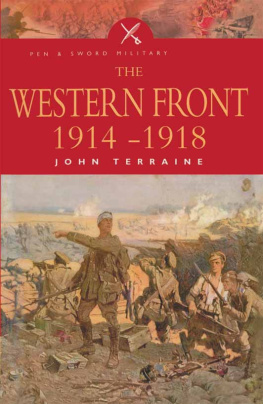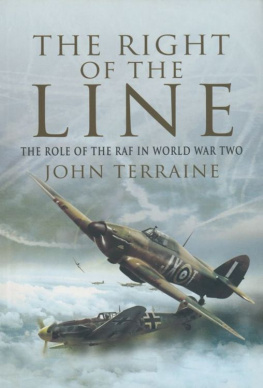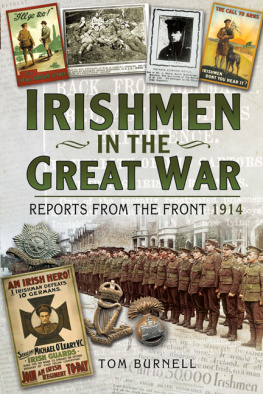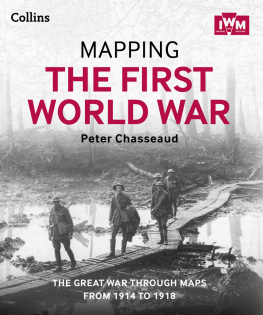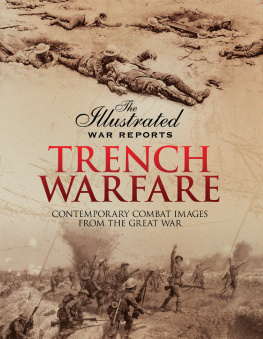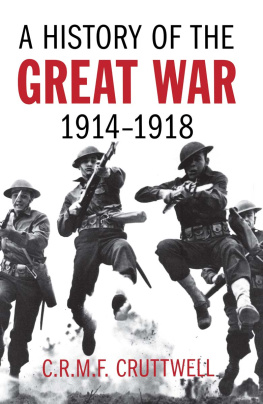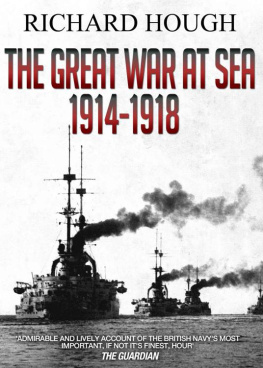John Terraine
The Great War 1914-1918

For copyright reasons, any images not belonging to the original author have been
removed from this book. The text has not been changed, and may still contain
references to missing images.
This electronic edition published in 2014 by Bloomsbury Reader
Bloomsbury Reader is a division of Bloomsbury Publishing Plc, 50 Bedford Square,
London WC1B 3DP
First published in Great Britain in 1965 by Hutchinson & Co. Ltd
Copyright 1965 John Terraine
All rights reserved
You may not copy, distribute, transmit, reproduce or otherwise
make available this publication (or any part of it) in any form, or by any means
(including without limitation electronic, digital, optical, mechanical, photocopying,
printing, recording or otherwise), without the prior written permission of the
publisher. Any person who does any unauthorised act in relation to this publication
may be liable to criminal prosecution and civil claims for damages.
The moral right of the author is asserted.
eISBN: 9781448214105
Visit www.bloomsburyreader.com to find out more about our authors and their books
You will find extracts, author interviews, author events and you can sign up for
newsletters to be the first to hear about our latest releases and special offers.
CONTENTS
The German militarism, which is the crime of the last fifty years, has been working for this for twenty-five years. It is the logical result of their spirit and enterprise and doctrine. It had to come.
It had to come: this considered verdict of the United States Ambassador in London, Walter Hines Page, in August 1914, has stood the test of time. The slowly woven unity of the German people was warlike from the first; it could scarcely fail to continue so, framed by three military empires, Russia, Austria-Hungary, and France under a second Bonaparte. Indeed, for Germany the problem of existence was always primarily strategic, whether it sought its solution through diplomatic arrangements or through war plans. Under Bismarck, war was very much an instrument of policy, and diplomacy remained vigorous and decisive. After Bismarck, diplomacy languished; war plans, down to their very details, became the deciding factor. Lord Haldane, the great British War Minister of 1906 to 1911, who understood Germany better than any other British statesman of his time, carried Walter Hines Pages thought one step further when he wrote: The reason why the war came appears to have been that at some period in the year 1913 the German Government finally laid the reins on the necks of men whom up to then it had held in restraint. The decision appears to have been allowed at this point to pass from civilians to soldiers. It is not their business to have the last word in deciding between peace and war.
A second German war within twenty-five years has supplied an illumination which was lacking to the writers of the 20s and 30s; it is now evident that 1939 was closely linked to 1918, that the interval was a breathing space in a continuous action, and that that action was the burgeoning of the German state and people, their striving toward world supremacy through their traditional instrumentsthe armed forces. Germany, then, is the starting point of the great European conflict of the first half of the twentieth century; Germany must be the starting point of understanding it.
The base of modern war is technology, disseminating itself through industry. Without technological advances, without industrial expansion, neither German diplomacy nor German war preparation could have carried the weight they did. In the period between 1871 and 1914 both made huge progress: the country which had been poor became suddenly rich. A primarily agricultural, rural nation became an urban one. Coal production, which until the advent of atomic power was, with steel, the very foundation of a modern state, went up from 30 million tons in 1871 to 190 million tons in 1913. In the decade of the 1880s, the German Empire doubled its output of steel and almost doubled that of iron. Sweeping educational reforms, with particular stress upon higher and technical education, bore swift fruit in Germanys quickly won leadership in the new chemical and electrical industries. Her shipping expanded, and with it her overseas trade. As with every other industrial revolution, the population itself also increased rapidly in numbersby 11 millions between 1880 and 1900, and by rather more than that figure between 1900 and 1914.
All this added up in the minds of a professional military hierarchy, not only to a further-proof, if any were needed, that Germany was marching from strength to strength, but to the assurance of a solid material base from which operations of war could be launched. From the moment when, in 1890, the young Kaiser Wilhelm II dismissed the Iron Chancellor, Bismarck, the military hierarchy, organised in the General Staff, steadily acquired greater and more dangerous influence. The Kaiser, mystically dedicated to the concepts of the supremacy of Germany and of the monarchy within Germanyindustrious, intelligent, pious, ardent, but also vain and impulsive and at times hystericalgradually ceased to be a presiding head of state, and turned himself instead into a war lord, identified with the military party. Only when it was too late did he realise to what an extent, in surrendering his arbitrating authority, he had become the prisoner of his own might. The army itself had become the prisoner of an idea.
The essence of the German military problemthe German problemwas simple and deadly: war on two fronts. A secret alliance with Austria signed in 1879 ruled out any likelihood of further danger from that quarterand at the same time linked together the aspirations and policies of the two Germanic empires. There remained Russia and France. When these unlikely partnersthe most autocratic imperialism in Europe and the young Third Republiccame together in 1888, the year of the Kaisers accession, war on two fronts became inevitable. All General Staff thinking would have to be based on this fact.
The famous Schlieffen Plan which, in a modified form, shaped German movement in 1914 contained two cardinal elements: a holding operation on the Russian front, in cooperation with Austria, and a lightning offensive against France with the mass of the German Army, aiming at a second Sedan. In the ebullient mood of pre-1914 Germany, this solution seemed well within her powers. That General Graf Alfred von Schlieffen, Single-minded, humourless, as mystical as the Kaiser in his attitude to the army, von Schlieffen displayed in the development of his plan on the one hand the immense intellectual and professional grasp which one might expect from a man of this stamp, and on the other hand the fatal limitation of this very professionalism when not restrained by a wider view.
For the plan contained two grave faults: first, it required from the German Army an effort beyond its strength, as von Schlieffen himself apprehended before he died; secondly, it presupposed infringements of neutrality which would forfeit all Germanys moral rights and multiply her enemies. This, at least, could have been prevented by statesmanshipbut the German statesmen had laid down the reins.
1
The Lamps Go Out
It did not need a Fort Sumter cannonade to set the world in flames in 1914, only the pistol shots of an assassin. The Archduke Franz Ferdinand, heir to the Austrian throne, was visiting Sarajevo, capital of the recently annexed province of Bosnia. It was a state visit, planned to include a ceremonial drive through the town by the Archduke, accompanied by his morganatic wife, Sophie, and escorted by the civic dignitaries, with inspections of troops, and finally an official address of welcome at the town hall.
Next page

